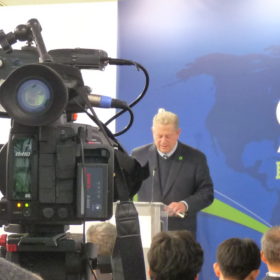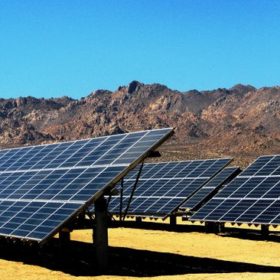About 400 GW of solar, wind needed per year to keep mercury rise below 1.5 C
Academics in Denmark and Berlin have calculated Europe will need 400 GW of new solar and wind facilities per year from 2025 to 2035 to contribute to capping global temperature rises, in line with the Paris Agreement.
Ramping up renewables now could save Europe €363bn by 2050
Delay, and policymakers will see the carbon emission allowance which would enable us to stay well below 2C frittered away so quickly net zero would have to be reached in 2040, rather than ten years later, when the relevant technology costs will be cheaper.
World is set for 3.3C temperature rise, predicts Bloomberg
Although the global solar industry might be cheered by the prospect of a healthy slice of an expected $12 trillion, 30-year windfall, governments are falling far short of steering us clear of catastrophic global heating, according to the analyst’s latest New Energy Outlook report.
Have global carbon emissions peaked?
Accreditation institute DNV GL has made some astonishing carbon-related predictions as it prepares the next edition of its Energy Transition Outlook report. The Norwegian body says transport-related emissions have peaked and those of the iron and steel industries may well have too.
Could Covid-19 be the catalyst for change where the COP process has stalled?
While the world’s climate negotiators dither, the post Covid-19 world could see their efforts overtaken – but only if policymakers are bold enough to take the opportunity to offer truly green fiscal stimulus packages to get us through the crisis. Felicia Jackson, from the center for sustainable finance of the School of Oriental and African Studies at the University of London, gives her thoughts here.
Clean energy must be rolled out six times faster
To have any hope of restricting global heating to a maximum of 1.5 degrees Celsius, the renewables success story which saw 108 GW of solar deployed last year needs to be cranked up to the next level – and fast.
IPCC: 1.5°C limit needs rapid and far-reaching action, but enables SDG progress
The Intergovernmental Panel on Climate Change (IPCC) has released a new report on different ways global warming can be kept within the 1.5°C limit. The panel seeks to inform policymakers before the upcoming COP24 in Poland this December. Resulting from their analysis, the 91 authors state that drastic action and significant investments are needed. Such climate action across all sectors would have significant positive effects on sustainable development progress, they say.







